Berkeleyan
A backward glance, a round of applause . and then, the final
The last teaching day of the fall approaches. Here's how some faculty plan to make the most of it
![]()
29 November 2006
With classroom instruction wrapping up next Friday, visions of final exams are apt to be dancing in students' heads - along with the usual flurry of questions about which material they really, really need to know. Faculty, however, have their own ideas on how to spend these precious closing moments of the semester. For some it's a time for giving thanks; for others it's a chance to take stock, play games, or share a meal. Via messages posted on Teachnet, an online forum for Berkeley faculty, a number of seasoned instructors recently described how they customarily approach their own last classroom sessions - sort of a gift to junior faculty in search of a bit of inspiration. A few representative samples are excerpted starting below.
* * *
The last day of class is often taken up with student presentations, but if not - or, when that is the case, the last day that I teach - I try to do an overview/synthesis where I go back over the topics we've covered and try to weave them together, and identify common themes, recurring issues, etc. Sort of "how did we get here?" and "how does it all hang together?"
I also always take some time to talk about what went well or badly in the course. I tell students that I'll get their anonymous evaluations, but that it's useful for my revisions to the course to have a discussion about it. I stress that what I hear from them will help me and future students. And I try to keep my mouth shut and not be defensive. I also often pose specific questions about material to include or exclude, whether topics need to be re-ordered, whether we spent too much or too little time on specific topics, and so forth. But I make sure that the discussion is open-ended enough that they can raise anything they think needs to be discussed.
Nancy Van House, School of Information
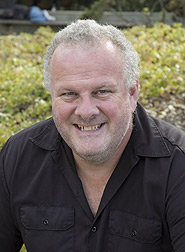 Steve Evans (Wendy Edelstein photo) |
I would like to have the courage (and the hubris) to do what Donald Knuth (a computer-science professor at Stanford, the originator of the Textypesetting languages, and one of the great theoretical computer scientists) does at the end of the semester. As he explains it in a lecture he gave in Munich in 2001:
"In every class that I taught at Stanford, the last day was devoted to 'all questions answered.' The students didn't have to come to class if they didn't want to, but if they did, they could ask any question on any subject except religion or politics or the final exam. I got the idea from Richard Feynman, who did the same thing in his classes at Caltech, and it was always interesting to see what the students really wanted to know."
Steve Evans, Math
For EECS 152 (Computer Architecture, an upper-division course where students form into groups of four or five, and spend the semester designing a CPU system and implementing it in real hardware), the last day is for project presentations. Students address the presentation to next semester's students. I take their PowerPoint and use selected slides to illustrate points about the project for the following semester's class (after removing names and photos of students for FERPA reasons, as lecture slides go on the class website). Since the project seems impossible to get working until you actually get it to work, seeing slides from successful groups from previous semesters is a morale boost that helps the students believe it is possible to complete it (in addition to providing useful advice).
John Lazzaro, Electrical Engineering and Computer Sciences
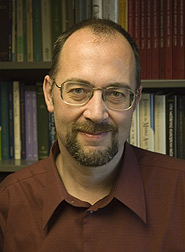 Steven Botterill (Wendy Edelstein photo) |
I usually tell the class that this is their last chance to ask me anything they may have been wondering about or that may not have been clear during the semester. It's surprising and sometimes disconcerting what comes up, and this can be very useful as an indicator of what needs to be rethought in future offerings of the course. ("What's going to be on the final?" is precluded in this context because I don't usually give final exams!) If that doesn't take up the whole time - though it most often does - I assume that we've all delighted in each other's company long enough and end the session. In semesters when I'm really organized, I bring Italian food, which reminds them why they're in Italian studies in the first place.
Steven Botterill, Italian
If I am teaching Chem 1A, I end the class with a game show that serves as a review for the final. Each lab section nominates four students to represent them as a team. I have brackets and prizes for the top two teams. I borrow a buzzer system from the quiz-bowl group on campus. The game show is patterned after Win Ben Stein's Money, with the same tacky puns and segues. For example, preceding the questions are wacky categories like "Ideally, I wouldn't have gas" or "If Beyonce gains any more weight, they will have to change the name of the band to Density's Child." I do need to spend time updating my jokes with the changing times. It is a fun way to end the semester and still accomplishes the task of reviewing for the final.
Michelle Douskey, Chemistry
For my introduction to astronomy for science majors course, I try to use the last class to describe a combination of my own research and/or a very active area of current research that relates to the class - to give them a sense of how much still remains to be understood (a point I try to make throughout the class as well). I also spend some time talking about opportunities for undergraduate research, since I think it is important for undergraduates to get a taste of research before they make a decision about whether they want to go to graduate school.
Eliot Quataert, Astronomy
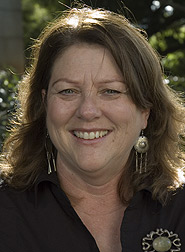 Jane Hammons (Wendy Edelstein photo) |
In the Advanced Composition class (College Writing 110), students hold a reading. I let them know the week before class ends what they will be doing, so they have time to excerpt and practice reading aloud a passage from a piece they've written over the semester, something that will take two to three minutes to read. They have the option to choose someone else (not me) to read for them, but by the time they've spent a semester working on writing together, most are comfortable reading aloud for this group. We hold all applause until the end so that the room is filled with student voices for about an hour and then the thunderous applause (I pretend some of it is for me).
Jane Hammons, College Writing Programs
In my undergraduate education class I use the last two meetings of the semester for what I call "performative reflections." The assignment asks students to think back over their semester in this course - considering what they have and haven't learned, how they have and haven't grown and changed in their thinking about the topics of the course, what has been disappointing, what has been enlivening - and to present those reflections to the class. The format is wide open - except that no traditional essays or written responses are allowed.
The presentations, which students prepare and perform in groups, are on the whole terrific. They are quite varied and include movies, "spoken word" performances, paintings, other artwork, dances, cartoons, skits, illustrated books, posters. And best of all, I have found that they often capture in vivid ways, for me and the class, what students have learned and what has been problematic as well as important for them.
Glynda Hull, Education
For my last class, I list the topic as "closing comments." In preparation, I include in the reader a few short but provocative pieces about the major issues and challenges facing our discipline and its application to real-world problems. I tell my students that I expect to hear their closing comments, that they can say anything they want, but that I expect to hear from all of them.
At the beginning of the last class, I offer my closing comments to sum up what I think we have learned as a group, important challenges in research and practice, and a bit of a pep talk about why it is important to do the work that we each deem important. Then, I ask for their closing comments. This has taken various forms from year to year, some years focusing more on the class itself, some years focusing on the major topics we have discussed, and some on the challenges that they face in finding ways to contribute to the world. But we have always had a conversation that distills where we have been as a group and bears on where they want to go.
Amy D. Kyle, School of Public Health
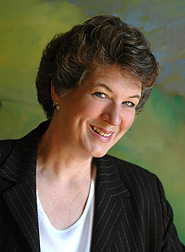 Martha Olney (Peg Skorpinski photo) |
First, I'd tell the new faculty that the Berkeley tradition is to applaud the prof on the last day. Be prepared to offer a gracious thank you. (Perhaps this is also a tradition where the new faculty did their grad work, but I've only experienced it here at Cal.)
On the last day, I make sure I have at least some time to offer "Concluding Remarks" - what I hope you learned in this course. My hopes are not specific, detailed bits of info from the course. They are instead broader: the importance of assumptions, the power of economics to explain real world events, and so on. Some things on my list change from semester to semester depending upon what's gone on that term. Fall 2001, I talked about 9/11. Spring 2002, I talked about doing what you love (it was the day my uncle, whom I had been caring for, died).
In general, I try to fit our experience together into the broader context of life.
Martha Olney, Economics
In my graduate pedagogy class, College Writing 300, we bring food for a potluck, I distribute an anthology of everyone's final projects, and we talk about ... how to end the semester.
Gail Offen-Brown, College Writing Programs
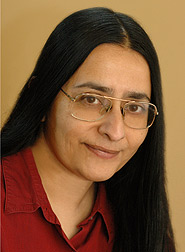 Ani Adhikari (Peg Skorpinski photo) |
In the last week it's hard to get students to think about anything other than the final exam. However, they do pay attention to discussions of "What have we learned?" and "Where does the subject go from here?" I provide suggestions for courses they might want to take, depending on their interests.
The last 10 minutes of all my courses are always the same: I take some time to thank the students for their part in the course and to tell them what they did to make my job easier (e.g., worked hard, asked questions, were cheerful, etc.). Many of them will go on to do statistical analyses in other fields, perhaps a few semesters down the road, so I encourage them to keep in touch.
Finally, I order them to relax on the night before the final: It's better to watch a stupid movie and sleep well than to pull an all-nighter and arrive at the final red-eyed with a can of Jolt in each hand.
This gets a loud laugh and then there's the usual end-of-term applause.
Ani Adhikari, Statistics

